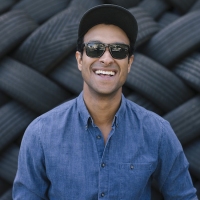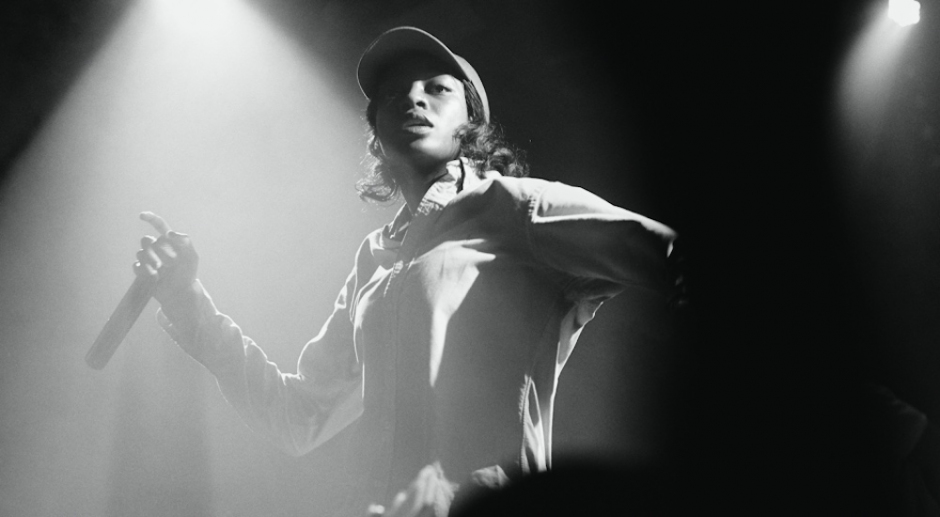 Premiere: Meet Boilermakers, Matt Okine's exciting new (but also old) hip hop projectAnd check out the awesome one-shot video for new single, Fade.
Premiere: Meet Boilermakers, Matt Okine's exciting new (but also old) hip hop projectAnd check out the awesome one-shot video for new single, Fade.

Little Simz: From Ordinary to Extraordinary
Little Simz on how she built herself up and her plans for the future.
All photos courtesy of Matt Kelly.
“…It sounds very self-indulgent when a rich man talks about the search for happiness”, stated James Packer in a 2013 interview with Mike Willesee. Finding connections between Packer, a rich (to put it lightly) billionaire who made his money in gambling, and Little Simz, a 22-year-old artist from North London, are limited. It’s like comparing the ordinary and extraordinary. But there’s a narrow tether that connects the two; a search for happiness.
Little Simz (real name Simbi Ajikawo)'s latest album, Stillness In Wonderland, a play on words of the book Alice In Wonderland, is exactly that.
“It’s about how the industry I’m in…I feel Alice’s story and my story are identical. We were in one place where things are normal and suddenly it clicks and changes when she enters Wonderland. Following the white rabbit was my dream, it was what felt right. You have moments where it’s amazing and then you have moments where you don’t want to be here."
And strangely enough this is where Packer and Ajikawo cross paths; they both feel hesitant to say not every day is a great day. Their paths diverge there but Stillness In Wonderland captures Ajikawo wondering amidst her burgeoning fame whether this is what she wants.
Ajikawo is quick to jump in here and clarify she isn’t ungrateful. She explains that it would just nice to be with her family or even sleep in her own bed over a hotel room. For musicians there is a stigma attached to expressing these views amidst the supposed success they’re experiencing. They’re told to be grateful for the opportunities they have and they should be grateful. But they also shouldn’t be criticised for the isolating lives they lead.
Thoughts of home are not unsurprising. Ajikawo had just got off at 30-hour flight from the UK the day before and has spent the day doing interviews before a headline show at Oxford Art Factory. But Ajikawo isn’t considering giving up, she’s stronger than that, rather she wants to question the industry she’s been placed in today.
Rap artists considering their role in the music industry are an oddity. Which is perhaps why Ajikawo eschews the term MC. The clues to her persona lie in her upbringing. Raised the youngest of four in London, Islington, she spent most her life on Essex Road. The music her siblings and she consumed was wildly different but hints at how she developed Little Simz’s sound:
“My brother was into Nas so when we got into the car it was straight Nas. My older sister Medina was more into neo-soul, afro beats like Erykah Badu, Fela Kuti, my middle sister was into UK garage and jungle. I picked up grime.”
Ajikawo explains at Highbury’s Girls School, you either liked grime or garage. A cursory knowledge of Little Simz’s catalogue would bring you the wall-busting track Dead Body that oozes grime. But Ajikawo is more than just another British artist riding the grime wave.
In 2014 Little Simz released E.D.G.E and buried near the end of the release, via her own label Age 101, is Mandarin Orange Part 2. Weaved into its tranquil mood and snapping beat are the lyrics, “I ain’t gonna lie I been thinking ‘bout my dad lately / Tryna figure out if he knew I was killin it / Would he have been part of my life for the benefits.”
This is a world away from the aggressive grime embodied in Dead Body and hints at the introspective nature of Little Simz’s work.
Ajikawo discusses her family, “My parents split when I was 11, I just didn’t see or hear from him. I’m not bitter or sad about it now. I’m fortunate to have the support of mum to keep me grounded. It worked out honestly.”
I press Ajikawo, asking if she was sad at the time. “I remember one minute he was there and then he wasn’t, it didn’t register. My life continued as normal, I think my mum helped to keep the family together and not let that affect us too much. And I wouldn’t be in the position I am if my mum hadn’t done that,” she says.
This split says a lot about Ajikawo’s character but also the strength of her mother. Raising a child is no simple task but four times over is titanic. Which is why Ajikawo speaks so fondly of her mother and how this drive is part of who Little Simz is.
At this point the conversation moves onto her time at St Mary’s Youth Club, a place Ajikawo describes as, “Allowing kids to do something in a positive manner – sports, IT or getting into the creatives like dance or music.” From the age of 8 till she was 17 Ajikawo was a dancer and between the age of 14 till 19 she also taught dance at the club.
Ajikawo no longer dances, mainly due to fitness but she remembers the impact the youth worker Nick Adams had on everyone there. “He made it a home and made it a place to feel safe. Instead of hanging on the street you’d go to St Mary’s.”
Adams wasn’t just your normal social worker. He had a worldly, interventionist view where children would see the globe and learn how they could create change in a positive way. “Nick did things out of the ordinary; he did trips that took us to Jamaica, he organised trips to Uganda because he wanted to show kids the world. It’s rare that you have a youth worker that works that hard for kids.”
Adams’ influence - he’s now a family friend - is part of Ajikawo’s identity. She spoke of her future ambitions, “I want to be a humanitarian and be actively involved in building communities up. I’ve got two hands and two feet, I can do something to help."
Gratitude, a song off A Curious Tale of Trials + Persons, was shot in South Africa and was Ajikawo’s attempts to highlight the ex-colonial state and the on-going problems. But Adams is not the only reason why Ajikawo’s motivated to change the world. “A lot of it is following in my mum’s footstep and leading by her example. It’s in my nature to do good in the world for people and myself. And show gratitude at all times.”
As the conversation ends we drift onto the topic of being ‘regular’, Ajikawo says sometimes she’ll just get the bus, eat lunch on her own or go for a skate. Which sounds odd but in a lifestyle often isolated from many she wants to stay as grounded as she can whether it’s helping people across the globe or standing on stage in Australia in a packed, sweaty room.
Leaving I think about how ‘regular’, Ajikawo is, her concerns and her desires to make a mark on the world. Six hours later I’m standing with a friend in Oxford Art Factory murmuring to them this thought. Half an hour later as the murky synths of Dead Body ring out and the crowd screams as Little Simz questions, “Do you want to see a dead body?” I realise Ajikawo is the opposite of ordinary, she’s extraordinary.

 Premiere: Meet Boilermakers, Matt Okine's exciting new (but also old) hip hop projectAnd check out the awesome one-shot video for new single, Fade.
Premiere: Meet Boilermakers, Matt Okine's exciting new (but also old) hip hop projectAnd check out the awesome one-shot video for new single, Fade.
 Methyl Ethel On Their Next Album: "It's already coming in to shape."They've just released a stellar second album, but Jake Webb is already looking to the next one.
Methyl Ethel On Their Next Album: "It's already coming in to shape."They've just released a stellar second album, but Jake Webb is already looking to the next one.